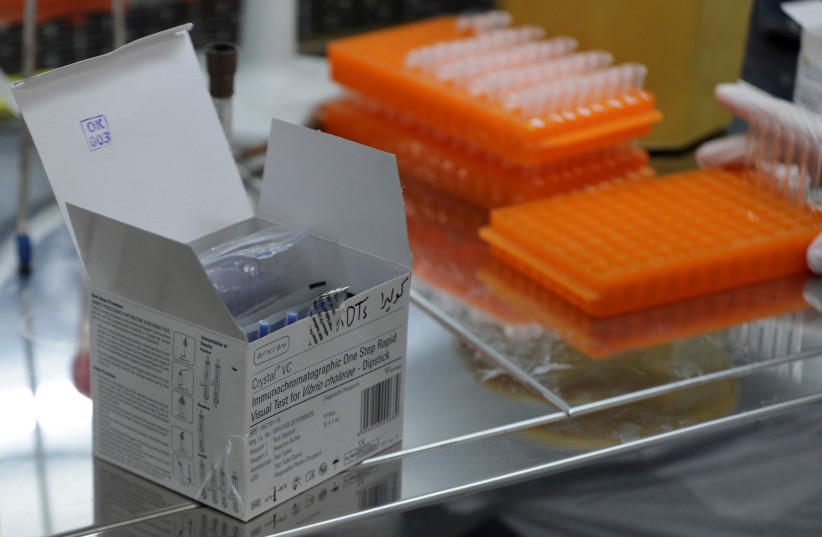[Beirut] Lebanon is facing yet another crisis. The Mediterranean country – already suffering from economic and political crises - has been dealing with its first cholera outbreak in the past 30 years. A month after its first case was reported, there are now around 2,709 confirmed and suspected cholera cases in Lebanon. In the past four weeks, 18 deaths have been caused by this disease.
For more stories from The Media Line go to themedialine.org
The outbreak started on October 5 when cholera cases were confirmed in a Syrian refugee camp in Lebanon’s Akkar region, in the north of the country. Other countries in the region already were suffering from the spread of the disease that originated in Afghanistan in summer. Iraq and Syria were heavily affected since, like Lebanon, they are areas struggling with devastated infrastructure, turmoil and with large populations of people displaced by war.
After Syria surpassed 20,000 suspected cholera cases and 75 deaths, the disease crossed the border and spread through the Lebanese population.
“Electricity cuts, low socioeconomic levels, the absence of sewer systems in rural areas and the refugee crisis are all essential factors regarding the spread of cholera, which is transmitted by water sources contaminated by the bacteria coming from stagnant waters and infecting peoples’ stools,” said Hasan Ismail, the Amel Association’s medical coordinator.
Ismail told The Media Line: “With all preventive measures absent in most Lebanese cadasters, the infection continues to spread, especially with vegetables and agricultural products irrigated with infected waters.”

Despite the disease arriving in the northern regions first, it soon reached other parts of the country. “The critical socioeconomic context allowed it to spread,” he said.
“Cholera, and other infectious diseases that could be usually prevented by sanitary and public health measures, are not in general considered endemic to Lebanon,” said Farah Nasser, Médecins Sans Frontières (MSF)’s deputy medical coordinator. “The current economic and energy crisis in Lebanon has further exacerbated access to safe water supply and sanitation services in the country,” she told The Media Line.
Reliance on local water sources
People in Lebanon’s remote and neglected areas, mainly in the north and northeast of the country, rely on polluted rivers and ponds to cover their water needs. That is where the vibrio cholerae bacterium, the bacteria that spreads cholera, infects them. A cholera infection is caused by consuming food or water infected with this bacteria. While most cases are mild to moderate, cholera can cause death if it is not treated correctly.
That is why organizations such as MSF, Amel or UNICEF are in a rush to treat these patients.
“Now winter is coming and we are going to see a lot more surface water and sewage overflowing that allows cholera to spread more easily,” UNICEF’s representative, Ettie Higgins, told The Media Line.
Anti-cholera efforts are focusing on vaccination, clean water and sanitation. Last week, Lebanon received the first batch of vaccines donated by France. More than 13,000 doses, especially for the front-line health workers, were donated by the philanthropic arm of French health care company Sanofi, and the French government facilitated their arrival to Lebanon.
But these emergency solutions cannot fix the root problems that the Lebanese population has been suffering for three years. The electricity crisis is one of them.
“Due to increasingly frequent electricity cuts, the area’s power-dependent water pumps had stopped working for an extended period, causing the water storage tank to run empty,” MSF’s Nasser said. “As a result, people are relying on unregulated water trucking to get their water supply,” she added.
“At UNICEF, we are trying to prevent cholera from becoming endemic, but the situation in Lebanon is not helping,” agreed Higgins.
Crippled health system
The crippled health system and the lack of public funding for proper water systems are putting more people at risk. The outbreak has reached Beirut, Mount Lebanon, central Bekaa, and southern areas. Only in the north have health authorities set up an emergency field hospital.
With an alarming exodus of doctors and nurses and the destruction of critical medical infrastructure in the August 2020 Beirut port blast, along with the lack of investment in health facilities, people in Lebanon are heavily relying on aid and treatments coming from non- governmental organizations. These organizations are the ones delivering oral rehydration solutions in order to avoid hospitals getting overwhelmed and reserving them for severe cases.
“Due to the international shortage of cholera vaccines, the two-dose strategy was modified and one dose will be used, so the coverage will increase and last for a shorter duration, hoping this will help contain the cases and limit the spread,” explained Ismail.
But the main field of action now is awareness and they are focusing their efforts in campaigning to give more information about the cholera symptoms and treatment.
UNICEF’s Higgins visited Lebanon’s northern areas this past weekend and what she found surprised her.
“People are very aware about COVID symptoms but they don’t know that cholera is different and that as soon as symptoms start showing, they cannot wait because it has to be treated immediately,” she told The Media Line, concluding: “There is a lack of understanding on the ground because Lebanon has been without cholera for 30 years.”
